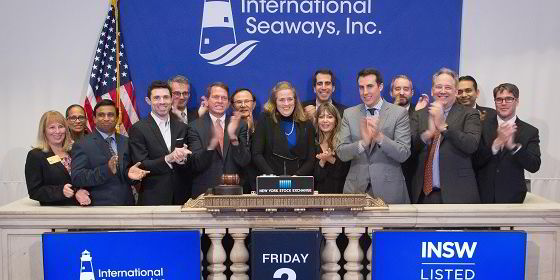International Seaways chief executive Lois Zabrocky says the tanker owner is considering potential acquisitions as values remain at lows not seen since 2013. Yet financing remains a challenge for shipping as public markets are closed to new shipping finance and bank lending remains scarce.
“At some point, we think it’s going to be the right time to invest in the sector,” Zabrocky said during a panel at the Hellenic-Norwegian Shipping Conference in New York. “As we move through the cycle we’ll try to take the opportunity to invest.”
International Seaways, which was spun-off from Overseas Shipholding Group, has a fleet of 55 vessels currently, Zabrocky said. She declined to share specifics of the strategy. But she did say it would be aimed more at fleet renewal.
“We are due for a renewal,” Zabrocky told TradeWinds.
But financing future acquisitions, whether newbuildings or second-hand, is still tough, she admits. Public equity markets continue to price shipping equities at a discount to net asset values. Zabrocky says there’s little point in selling equity to investors at those current discounts.
“At some point, we would like to close that gap with public markets,” Zabrocky said.
However, she says the company has been meeting with investors, mostly to introduce them to the newly public company. Likewise, the addition of former Jefferies investment banker Jeffrey Pribor to the role of chief financial officer has also increased interest among both equity and debt investors.
After Pribor came aboard, “every bank has been to see us now,” Zaborcky said. “We’ve been meeting a lot of people.”
Other panelists said that capital remains tough to source. Tom Kane, managing director at Chatsworth Securities, says there is a $70bn gap in shipping capital due to the retreat of major banks from the sector.
He says a variety of investors spanning hedge funds to pension funds are looking at new shipping investments. But those investors appear more keen to participate in private placements and specialty finance deals.
“On the public markets, it’s not too rosy at the moment,“ Kane said.
Being a publicly traded company is difficult due to the extra expenses and regulations, Zabrocky says. But the extra transparency makes the company attractive to both charterers and financiers. Likewise, Zabrocky says shipowners will be able to tap public markets once investors see a sustained recovery in freight rates and asset values.
“The equity will be there when it happens,” Zabrocky said.
But Bob Burke, the chief executive of privately held Ridgebury Tankers, took a dissenting opinion on the merits of public equity markets. Aside from the increased costs and regulatory oversight, he says public investors push shipowners to expand only when the markets look rosy, which is the exact wrong time in the cycle.
A publicly listing for a shipowner “is fundamentally flawed because you are forced to buy at the top of the market,” Burke said.



